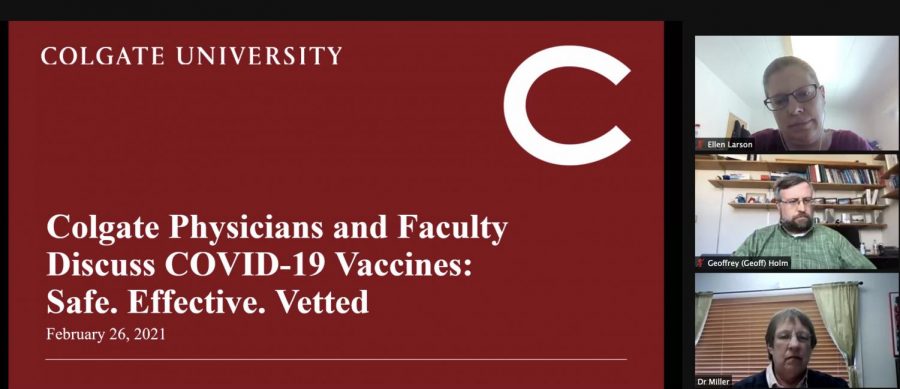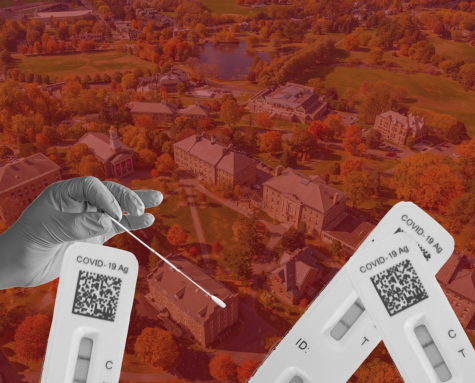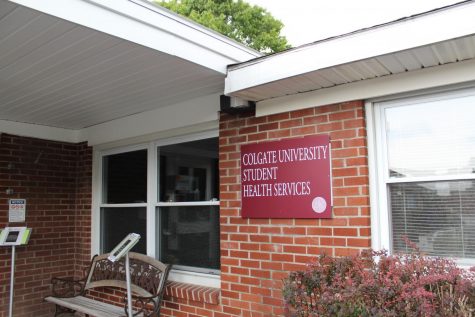Colgate Physicians Discuss COVID-19 Vaccines
Colgate faculty and staff members hosted a webinar to discuss vaccine development, hesitancy, New York State eligibility requirements and availability on Friday, Feb. 26. Entitled “Safe. Effective. Vetted: Colgate Physicians Discuss COVID-19 Vaccines,” the discussion was led by Director of Student Health Services Dr. Merrill Miller, Colgate physician Dr. Ellen Larson, Associate Professor of Biology Geoff Holm and Vice President for Communications Laura Jack.
“We know that there has been a lot of interest, anxiety and, in some cases, misinformation out there on campus about the vaccines and Colgate’s role in dispensing vaccines to the campus population,” Holm said. “We thought it would be appropriate to host such an event to inform the campus community about the vaccines and clear up some of the information.”
Holm began the webinar by providing an overview of the vaccine development process.
“The vaccines were developed based on the genomic sequence of SARS Coronavirus Type II, which was published not too long after [being] identified as causing infections of January 2020,” Holm said. “Based on that sequence information, a lot of companies started to develop vaccines, and so the vaccine development process really started mid-January last year.”
Miller weighed in on New York State vaccine eligibility and availability, noting that there is currently limited availability for the general population to receive the vaccine.
“We know that the ideal scenario would be for everybody to get it in a very short amount of time. That’s not feasible, so there are phases and categories of people who are more at risk and thus should go ahead and get the vaccine before others,” Miller said.
Colgate has been approved by New York State to be a Point of Dispensing for the campus community, with the Colgate Student Health Center awaiting the arrival for doses of the vaccine, according to Miller.
“We did go ahead and file to be a vaccination site and have done all the planning in terms of the space available, the special refrigerators and freezers,” Miller said. “We have trained 24 student EMTs to go ahead to be vaccinators to help us out.”
Larson addresses concerns regarding hesitancy to receiving the vaccine, strongly encouraging Colgate community members to get the vaccine “with only a few exceptions.”
“There is a lot of work going into open means of communications for those communities in the past who have been underserved and misserved by the healthcare system,” Larson said. “There are active efforts to open lines of communication and reach out to those communities.”
Exceptions for receiving the vaccine include those who are allergic to its components and children under sixteen, according to Larson, who also discussed the notion of “herd immunity” and its role in the vaccine distribution process.
“We don’t necessarily need every single person in the population to be immune, we need enough people in the population to be immune that it stops transmission of the virus,” Larson said. “That immunity can come either by infection or vaccine, at this point we would certainly prefer that more people are immune by vaccine than by infection.”
A question regarding international students’ eligibility to receive the vaccine was brought up during the discussion.
“New York state residents, or people who work in New York state, are eligible to get the vaccine in New York state at no cost according to the phases and priority,” Miller said. “Our international students and all of our other students are residents of New York state when they are here.”
Another question asked during the discussion was how members of the Colgate community will know they are eligible to receive doses of the vaccine once it arrives at Colgate’s on-site vaccination center.
“We will be sending out a notification to Colgate employees… an online survey going in and asking for some information to help us to go ahead and categorize folks and also help us to know who may have already received the vaccine,” Miller said. “For our students, we have their records, so we have already prepared a list of those students who are at high risk, and they will be notified.”
Holm provided insight in response to a question regarding the unknown long-term effects of the vaccine.
“Immunologically, there’s really no evidence of any long-term effects of the vaccine that don’t appear within the first couple of weeks following vaccination,” Holm said. “There is not a lot of evidence that there’s any long-term consequences outside of things that happen immediately and then have long-term effects after.”
Holm continued to discuss the likelihood of adverse reactions to the vaccine.
“The safety and efficacy that has been observed within the clinical trials for these vaccines suggests that those events, those adverse events, are really minimal and rare,” Holm said.
Sophomore Mackenzie Laurion said she wanted to attend the webinar because of her role as a student EMT.
“I’m constantly trying to learn more about what Colgate is doing because my friends do rely on me for understanding when we will receive vaccines and how Colgate is handling it,” Laurion said. “This webinar helped me to understand more of the facts about the safety and efficacy of the vaccine.”
A concluding question from a webinar attendee opened discussion for when life will be “back to normal” again.
“I think it’s remarkable that we have this much information about this, as we do now, given the fact that this pathogen has only been around for just over a year,” Holm said. “Data takes time to collect and we’ll get there and we’ll have that information, but just be patient, we’re trying to follow the data as best as we can as it comes out and we’ll pass that along as soon as we have a better picture.”

Sydney Henderson is a senior from Whitesboro, NY concentrating in economics. She has previously served as a staff writer for the news section. On campus,...











